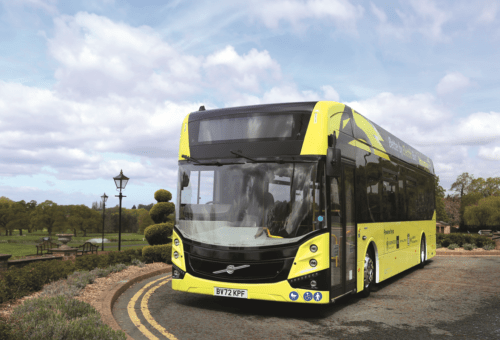
Jonathan Welch begins his report from the ALBUM conference in Warrington, where the theme this year was ‘moving on up’
There can’t be many people in the industry who haven’t heard of ALBUM, the Association of Local Bus Company Managers – and even fewer who read CBW, given that we previewed the organisation’s annual conference two issues ago. ALBUM is an association which exists to provide a forum for small and medium bus operator members – those outside the auspices of the big groups – to exchange best practice, to influence policy and respond to Governement consultations, and for the promotion of high quality services that encourage, we hope, more people to travel by bus.
ALBUM currently has around 150 members nationwide, representing municipal and independent bus operators, and has separate marketing, engineering, finance and operation focus groups which meet regularly. There are also a large number of associate members, namely the suppliers who support the industry.
Following a hugely successful event last year hosted by Lothian Buses in the heart of its home city, Edinburgh, this year’s conference moved south to be hosted by another municipal, this time Warrington’s Own Buses. Unlike in Edinburgh, this year’s conference was held some distance away from its host’s home base, in the rather grandiose and swanky surroundings of Carden Park, a sprawling country house hotel, spa and golf complex located a short drive south-west from Warrington, between Chester and Wrexham.
Spread over three days, the first day, Monday 22 April, featured an ice-breaking golf event for those so minded, sponsored by Allison Transmission and Equans, followed by a depot visit to view Warrington’s new home for its future electric fleet of 105 Volvo BZL electric buses, with the added bonus of travel by heritage bus from Carden Park. Sponsored by Volvo, MCV and Passenger, there was also time for more networking and socialising opportunities in the form of a comedy evening. We’re told that the day, and the evening’s entertainment, was enjoyed by many, as were the Tuesday and Wednesday evening options too; Tuesday featured a ‘Family Fortunes’ event and dinner, sponsored by Adverta and Allison Transmission, whilst the ‘End of the Show Show’ gala dinner on Wednesday was also popular, offering a three course dinner, an interesting after-dinner speaker and an 80’s DJ, sponsored by Marketing Bees.
But as interesting as the social side of these events is (and it’s always welcome, and often very productive, to be able to catch up with colleagues from across the industry in a less formal setting), CBW’s focus was on the presentations by knowledgeable industry minds, as well as catching up with suppliers and our own contacts across the industry; if I didn’t get around to you, I’m sorry, as always there were so many people to speak to, and there’s never quite enough time to meet everyone.

An electric welcome
The conference was hosted by former BBC Northwest Tonight Chief Reporter Dave Guest, a familiar face to regular attendees. Naturally, Dave carried out his duties with aplomb, and opened the two days of discussions by welcoming attendees and promising ‘an exciting couple of days with inspiring speakers providing food for thought,’ as well as thanking the event’s main sponsors, which included Alexander Dennis, Asset Alliance Group, EO Charging, Pelican Bus & Coach, and Volvo, along with local Volvo dealer Thomas Hardie Commercials.
Dave also recalled that his first time hosting the event had also been in Warrington in 2007, and reflected on how the industry has changed in the intervening years, and has ‘huge changes’ still ahead.
Dave’s welcome was echoed by the first two speakers: ALBUM Chair Bill Hiron and Warrington’s Own Buses Managing Director Ben Wakerley.
[…]By subscribing you will benefit from:
- Operator & Supplier Profiles
- Face-to-Face Interviews
- Lastest News
- Test Drives and Reviews
- Legal Updates
- Route Focus
- Industry Insider Opinions
- Passenger Perspective
- Vehicle Launches
- and much more!


